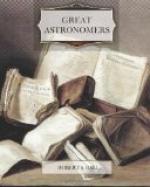For the full interpretation of the movements of the heavenly bodies, mathematical knowledge of the most advanced character is demanded. The mathematician at the outset calls upon the astronomer who uses the instruments in the observatory, to ascertain for him at various times the exact positions occupied by the sun, the moon, and the planets. These observations, obtained with the greatest care, and purified as far as possible from the errors by which they may be affected form, as it were, the raw material on which the mathematician exercises his skill. It is for him to elicit from the observed places the true laws which govern the movements of the heavenly bodies. Here is indeed a task in which the highest powers of the human intellect may be worthily employed.
Among those who have laboured with the greatest success in the interpretation of the observations made with instruments of precision, Le Verrier holds a highly honoured place. To him it has been given to provide a superb illustration of the success with which the mind of man can penetrate the deep things of Nature.
The illustrious Frenchman, Urban Jean Joseph Le Verrier, was born on the 11th March, 1811, at St. Lo, in the department of Manche. He received his education in that famous school for education in the higher branches of science, the Ecole Polytechnique, and acquired there considerable fame as a mathematician. On leaving the school Le Verrier at first purposed to devote himself to the public service, in the department of civil engineering; and it is worthy of note that his earliest scientific work was not in those mathematical researches in which he was ultimately to become so famous. His duties in the engineering department involved practical chemical research in the laboratory. In this he seems to have become very expert, and probably fame as a chemist would have been thus attained, had not destiny led him into another direction. As it was, he did engage in some original chemical research. His first contributions to science were the fruits of his laboratory work; one of his papers was on the combination of phosphorus and hydrogen, and another on the combination of phosphorus and oxygen.
His mathematical labours at the Ecole Polytechnique had, however, revealed to Le Verrier that he was endowed with the powers requisite for dealing with the subtlest instruments of mathematical analysis. When he was twenty-eight years old, his first great astronomical investigation was brought forth. It will be necessary to enter into some explanation as to the nature of this, inasmuch as it was the commencement of the life-work which he was to pursue.




